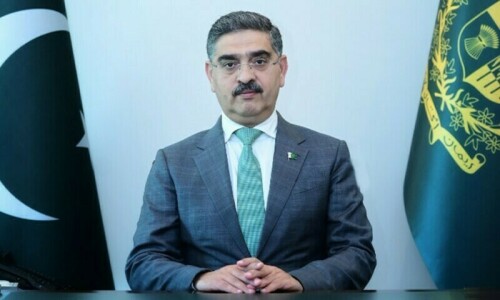DAVOS: Chinese Prime Minister Li Qiang told the world’s political and business elites in Davos on Tuesday that “discriminatory” trade barriers were a threat to the global economy, in a not-so-subtle dig at the United States.
Li’s remarks came as the World Economic Forum’s (WEF) 54th annual conference is preoccupied with a slew of global risks, including war in Ukraine and bombardment in Gaza, climate change and the rapid rise of artificial intelligence.
Li shared the spotlight with Ukrainian President Volodymyr Zelensky, who attended the forum in person for the first time in an effort to maintain military support from Kyiv’s allies after nearly two years of war with Russia.
Li spoke just days after a tense presidential election in Taiwan, the democratic island that Beijing claims as part of China.
But the most senior Chinese official to attend the WEF since 2017 did not address the election and instead focused on trade, his country’s economy and AI.
He said “new discriminatory trade and investment measures” had appeared every year, adding: “Any obstacles or disruptions can slow down or block the flow of lifeblood of the world economy.”
Li did not name any countries but Beijing has tussled with the United States and the European Union over trade in recent years, particularly on high-tech and clean energy.
US-China trade tensions soared under the presidency of Donald Trump and have continued under President Joe Biden.
In October, the United States announced tighter export curbs on state-of-the-art artificial intelligence chips, sparking fury in Beijing.
The EU, meanwhile, has launched a probe into Chinese electric car subsidies.
Without naming names, Li said: “There are many examples where one side’s capriciousness undermines mutual trust with others.”
But US and European companies have long complained of obstacles to doing business on a level playing field in China.
Ukraine support
Zelensky took the podium hours later and used the venue to condemn Russian President Vladimir Putin as a “predator” who would pursue his invasion of Ukraine even if fighting paused on the sprawling front.
Earlier, he met the “CEOs for Ukraine” group and US Secretary of State Antony Blinken.
Kyiv is scrambling to ensure that support from allies does not waver during the biggest war in Europe since World War II.
The world’s attention has shifted to the Middle East amid fears of a spillover from the conflict in Gaza.
“We are determined to sustain our support for Ukraine,” Blinken said after the talks.
Republicans in the US Congress are blocking a renewal of US military assistance for Ukraine, and Kyiv and its allies worry about reduced support if Donald Trump wins the US presidential election later this year.
Published in Dawn, January 17th, 2024













































Dear visitor, the comments section is undergoing an overhaul and will return soon.